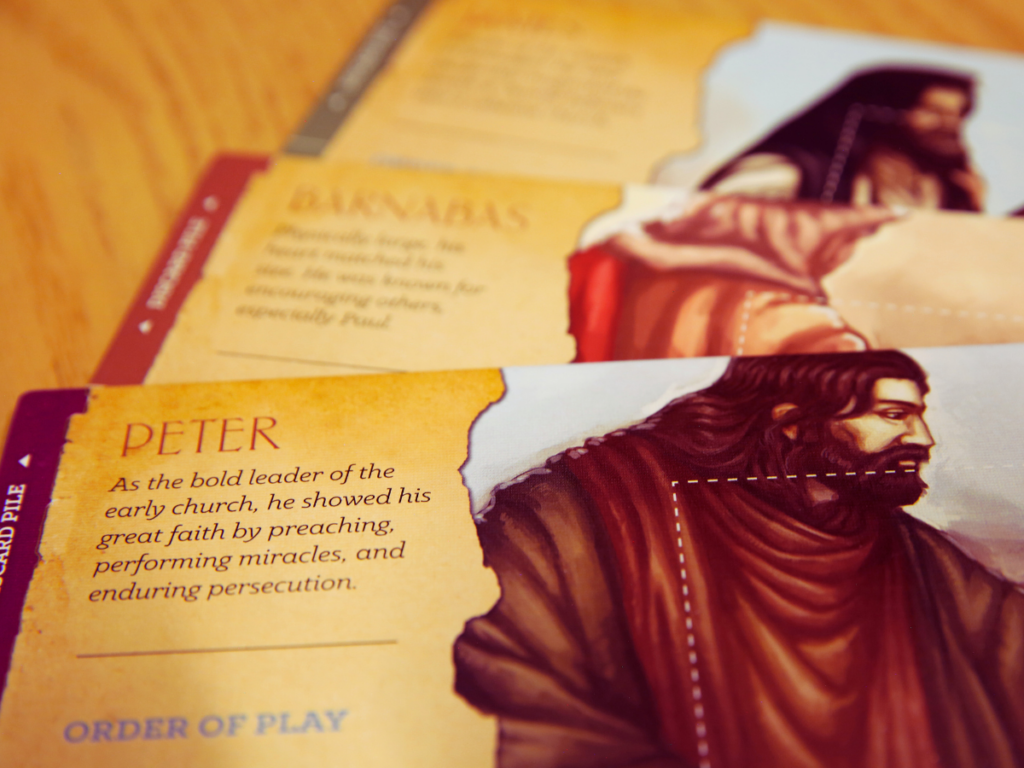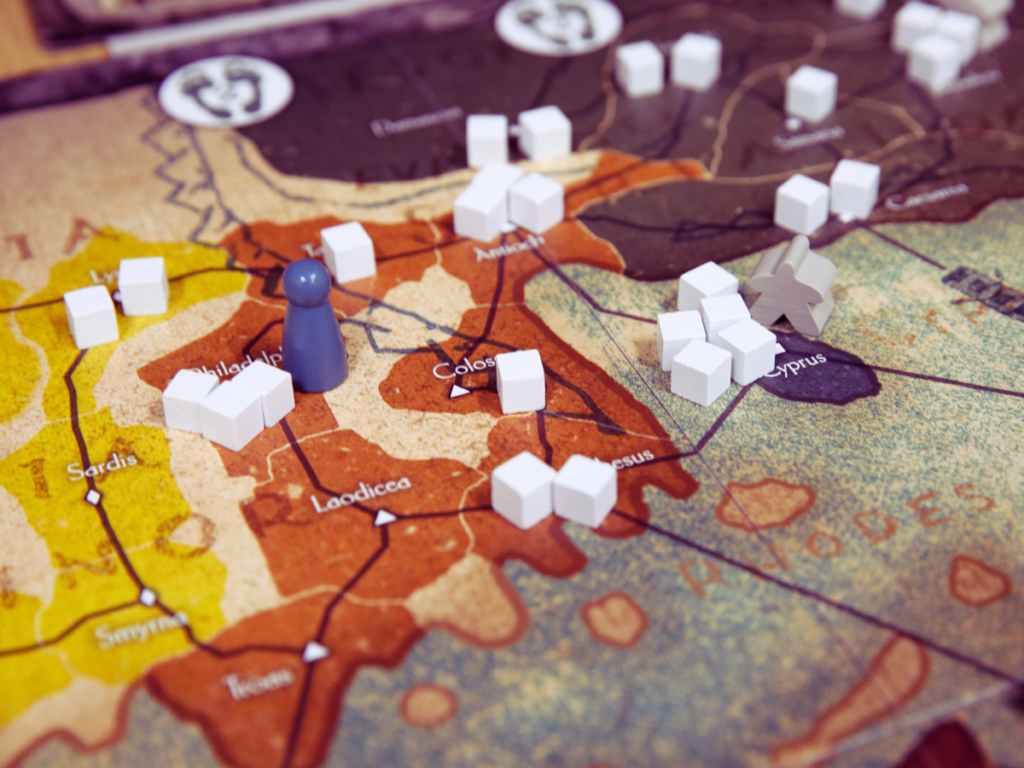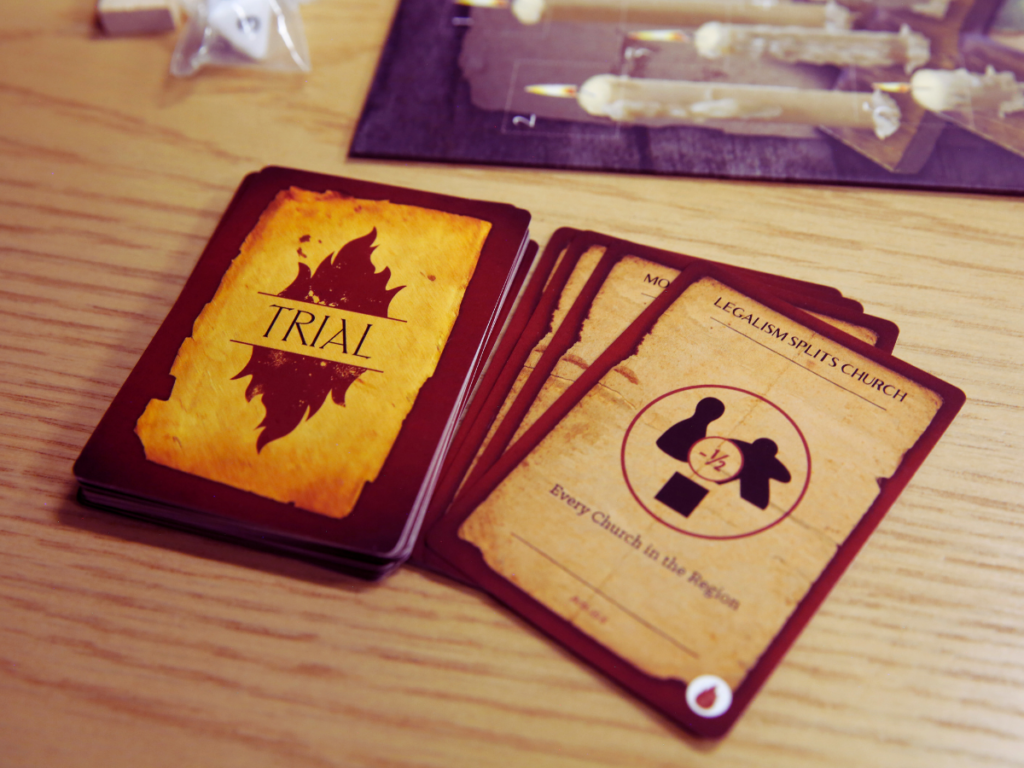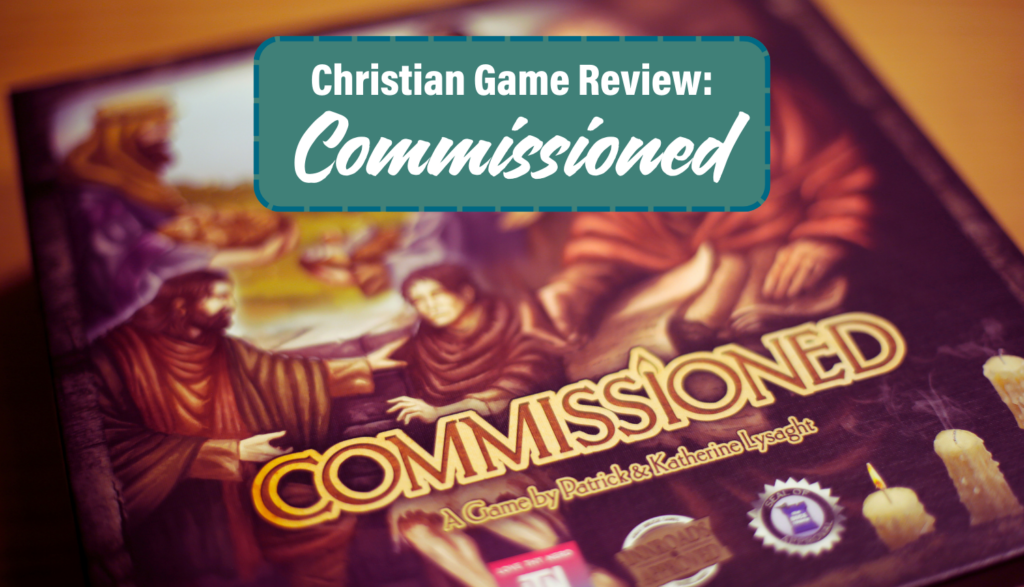“All authority in heaven and on earth has been given to Me. Go therefore and make disciples of all nations, baptizing them in the name of the Father and of the Son and of the Holy Spirit, teaching them to observe all that I have commanded you. And behold, I am with you always, to the end of the age.” (Matthew 28:18-20)
And when the apostles had received the Holy Spirit at Pentecost, they began to preach the gospel in Jerusalem and then in all Judea and Samaria. It’s a message that continues to be shared all over the world. And in Commissioned, a game created by Patrick and Katherine Lysaght, players will experience that spread—as well as the difficulties those missionaries faced.
You, along with up to five of your most determined friends, play as an assortment of apostles, guiding them on their missionary journeys. And don’t worry: no matter if you decide to play as Andrew, Barnabas, James, John, Paul or Peter, you’re all on the same team. You’ll travel from town to town, preaching the gospel and building up churches while you play against the board as it throws various trials at you in an attempt to hinder your mission and extinguish your churches.

Commissioned attempts to showcase the spread of the gospel as seen through the book of Acts, as well as “the first 150 years of church history,” according to the game’s rulebook. Players will encounter pitfalls and resistance that will threaten a quick ‘game over.’
And though God confirmed that He would not allow the church to fail in our history, well, the fate of the church in Commissioned rests in your fallible and distinctly unsovereign hands.
Good luck.

Components
Commissioned comes with a 12-page rulebook. It also comes with five double-sided scenario cards that change the victory conditions for each playthrough. The box likewise contains various wooden stand-ins which represent player apostles, fellow missionaries and church members. Players use 96 “faith cards” to help them build the church and bolster themselves against the 27 “trial cards” they’ll face. Each player will also be given a personalized player board for the apostle they choose to play, and one player will get a wooden “Elder’s Staff” to indicate their leadership for the round. Other tokens depict the looming effects of trial cards, such as a church that is unable to gain more members and a counter for extinguished churches. Finally, a double-sided game board depicting the Mediterranean area and an eight-sided die round out the gameplay elements, while a “Theme Appendix” cites the Bible verses or historical context that served as inspiration for the aforementioned faith and trial cards.
Gameplay
Commissioned offers players five different scenarios from which to choose: Acts of the Apostles, Peter’s Gentile Outreach, The First Missionary Journeys, Appeal to Caesar, and To the Ends of the Earth. The scenarios start players on different portions of the board with different restrictions and resources, as well as special rules the players may have to follow and the conditions for victory. And, just to raise the stakes a bit, these scenarios also come with the consequences you’ll reap if you fail, from “The Roman Empire never adopts Christianity” to “The Church never expands beyond Judea.”
In addition to these scenarios, players will choose between the easier “Disciple” or harder “Martyr” difficulties, the latter of which includes far more punishing trial cards for players to endure. Yet despite the five different scenarios, games are relatively simple: move your missionaries and apostles around the board to create and grow churches in various cities. In terms of other objectives, players will sometimes need to collect cards representing the New Testament canon to show it being written throughout their journey.
But don’t expect the journey to be easy. Each turn, you’ll have to draw a trial card which will hinder your mission in some way, from eliminating church members from a region to imprisoning your apostle for a number of rounds, thus preventing the gospel from advancing to the next city. If five churches are extinguished (by losing all their church members) or if you run out of cards in the trial deck before meeting a scenario’s victory conditions, you lose the game.
Now, we played Commissioned a few times, and we found the game to be rather difficult. Even though we were eventually able to win a game, it took all of us planning and working together in order to accomplish our objectives before we ran out of time. But while it’s likely that your first game will end in a loss like ours did, the difficulty speaks to the very trials, persecutions and challenges that the actual apostles faced as they spread the gospel throughout the world. It’ll likewise make victory all the more satisfying.

Spiritual Elements
Notwithstanding the game’s inherent connection to the missionary journeys of the book of Acts, Commissioned’s components and rules alike are based in Christianity. Players play as the apostles and hope to raise churches across the Mediterranean region. The back of each scenario card provides a brief history of the events summed up in the scenario’s title, from Paul’s conversion to Christianity to Peter’s call to preach to Samaritans and Gentiles.
Turns themselves are based in Christian themes, too. At the start of each turn, players draw a trial card, many of which are based on a Scripture citation found at the bottom of the card. Then, players move into the “pray” phase in response to these trials, wherein they draw faith cards they can play to help counter these trials. These faith cards come in four levels: “1-Faith” cards usually provide one small benefit. “2-Faith” cards provide one board effect or the choice to add some books to the New Testament. “3-Faith” cards help add church members and missionaries. They also counter trials that prevent the church from growing. Finally, “4-Faith” cards “reflect miracles in the early Church” and provide powerful boons for the gaming group. Like the trial cards, each of the 3- and 4-Faith cards additionally have titles like “Great Commission,” “Jailhouse Earthquake” and Jerusalem Council” with Scripture citations for what those titles are referencing.
And for those who don’t have a Bible immediately on hand, the game’s Theme Appendix provides the verbatim Bible verses so players can read the aforementioned citations.

Noteworthy Potential Concerns
There’s nothing here that we think will immediately raise an eyebrow, content-wise. Some cards reference persecution, and Christians being martyred is here, too.
Though if we had to point out a more philosophical issue, some may dislike the idea of playing as the apostles and having the ability to fail their gospel mission.
Conclusion
If you’ve played the popular board game Pandemic, in some ways, Commissioned is like a reverse version of that game.
In Pandemic, players fight against the board as tiny disease cubes spread across the world—tiny cubes which players hope to eradicate before they spread too far. Meanwhile, Commissioned tasks players with spreading church-representing cubes across the board while the game attempts to eradicate the gospel before it gets too far.
That comparison is purely made to help people understand the gameplay. But the two games are similar in another way: the game can quickly become extremely difficult depending on the cards you draw.
It’s somewhat of a flaw for nearly any game that tasks players with strategizing against the board itself, wherein a single arbitrary card flip can make a playthrough feel too easy or near impossible to win. For example, your first Trial card may cause you to simply lose one Church member—not a big deal, you can recover from that quickly and continue on. But in your next playthrough, your first Trial card may cause you to lose half of your starting church population—making your initial spread into adjacent regions twice as difficult as it might have been had you drawn something else. And, if we’re being honest, that latter scenario can feel pretty frustrating.
But at the same time, Commissioned benefits a little from that randomness. Because even though those card draws can feel oppressive and unfair at times, they also give players more appreciation for the things the apostles endured–especially children who may not have truly thought about the difficulties the disciples faced in their missionary journeys. In essence, the game’s historical and spiritual basis gives its challenges more leeway perhaps than other historical games.
So, maybe you’ll win every game of Commissioned you ever play. Maybe you’ll never manage to succeed. In either case, the game reminds us that the events it references really did happen and that the apostles endured these trials and prevailed through the power of the Lord. And that’s a victory that was guaranteed, even in spite of your gaming table’s uncertain success.








One Response
I think this sounds more interesting and less philosophically problematic than some Christian board games I’ve seen on here (it’s not turning “angels versus demons” into a mechanical exercise where we don’t know the outcome ahead of time, for instance), though the “luck of the draw” element could prove unbalancing: I could see some homebrew games, especially with younger or less experienced players, taking “sacrifice half of your church population” out of their Trial decks or limiting its effects (e.g., restricting the card’s effects to one or two churches in a region, not all of them).